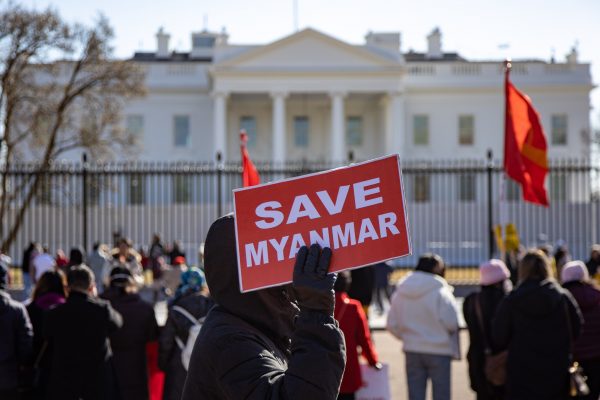Upcoming election
The United States (US) will hold its presidential election on November 5, 2024, with the newly elected president set to take office on January 20, 2025. Vice President Kamala Harris and former President Donald Trump present starkly contrasting foreign policy agendas. One of the key challenges for the next administration will be addressing the ongoing civil war in Myanmar and determining the scope of the U.S. role in resolving the conflict. The U.S. currently has a “hands-off” approach to the crisis [i]. In 2022, the Burma Act was passed, creating a framework for U.S. policy toward Myanmar. The legislation positions the U.S. as a key provider of humanitarian aid and a supporter of democratic reform. However, the bill’s ambiguous language regarding funding allocation leaves much of its execution up to the discretion of the next administration. While overall U.S. policy towards Myanmar is unlikely to shift significantly under either a Harris or Trump presidency, the way in which the Burma Act is implemented will.
Evolving US policy towards Myanmar
In 2016, the Obama Administration lifted trade sanctions against Myanmar government officials, claiming that “the situation that gave rise to the national emergency… has been significantly altered by Burma’s substantive advances to promote democracy…” [ii] President Obama cited the 2015 democratic elections as a major achievement, but after the military-led a campaign of ethnic cleansing against the Rohingya in 2017, the Trump Administration placed targeted sanctions on top government officials.
In September 2017, the US provided $32 million in aid to Rohingyas fleeing Myanmar, who primarily fled to Bangladesh. [iii] According to the US Bureau of Population, Refugees, and Migration (PRM), the US has provided more than $2.5 billion since August 2017 as part of its regional Rohingya response. Of this amount, approximately $2.1 billion went to Bangladesh, which is the largest receptor country for Rohingya refugees. [iv]
Under the Biden Administration, the bipartisan Burma Act was passed, which set standards for humanitarian and non-lethal assistance in promoting democracy, religious freedom, and human rights [v].The Burma Act provides guaranteed funding for promoting ethnic and religious tolerance and human rights, but funding is not guaranteed for the other programs outlined in the bill, such as the peaceful establishment of inclusive and representative democracy [vi]. The Biden Administration has delegated significant responsibility for the crisis to the Association of Southeast Asian Nations (ASEAN) and supports ASEAN’s Five Point Consensus Plan [vii].
Vice President Harris and Myanmar
In 2019, as a Senator, Harris cosponsored the Burma Human Rights Act, which authorized $220,500,000 to be appropriated for 2020 for humanitarian assistance for ethnic groups and civil society organizations in Myanmar, Bangladesh, Thailand, and the region [viii]. As Vice President, Harris attended the 11th ASEAN-US Summit and stated that the US would push the regime to “reestablish Myanmar’s path to inclusive democracy” [ix]. However, the summit primarily focused on the US’ shift to the Indo-Pacific as part of its deterrence strategy against the People’s Republic of China (PRC).
Under a Harris Administration, experts do not expect a drastically different Myanmar approach than the Biden Administration, nor is she expected to drastically change the current government’s Asia staff [x]. The current Deputy Secretary of State, Kurt Campbell, who is commonly referred to as the “Asia Czar”, is expected to play a prominent role in a potential Harris Administration. He maintains engagements with various opposition parties in Myanmar and the State Administration Council (SAC), the junta’s governing body [xi]. Unlike a Trump presidency, Vice President Harris is more likely to pursue multilateral engagement in Southeast Asia and the Indo-Pacific, but it is unclear how much of a focus will be on Myanmar.
Former President Trump and Myanmar
President Trump’s foreign policy was characterized by the “America First” agenda,” which focused on pursuing strategic interests to enhance US economic interests. This approach favored pragmatic bilateralism over norms-based multilateralism [xii]. After the violent military crackdown on the Rohingyas in 2017, the Trump Administration imposed targeted sanctions against senior government officials and supported the Rakhine Commission, but attention to the crisis was otherwise minimal.
Human rights advocates urge the U.S. to strengthen its diplomatic support for resistance groups and enhance the measures outlined in the Burma Act. However, some experts worry that a second Trump presidency might result in a weaker implementation of the Act. This could mean less emphasis on sanctions and humanitarian aid, and a greater likelihood of engaging in negotiations with the junta [xiii].
Conclusion
Advocates are calling on the U.S. to take a more active role in addressing the crisis in Myanmar, specifically by using the Burma Act to introduce stronger measures beyond humanitarian assistance. However, the US is unlikely to drastically change its Myanmar approach. The differences between former President Trump and Vice President Harris will most likely reside in the strength of their implementation of the Burma Act, rather than fundamental changes in existing policy.
Citations
[i] https://thediplomat.com/2024/08/why-the-next-us-president-should-shift-myanmar-policy/] [ii] https://www.reuters.com/article/world/obama-announces-lifting-of-us-sanctions-on-myanmar-idUSKCN127262/ [iii] https://edition.cnn.com/2017/09/20/politics/us-aid-rohingya-myanmar/index.html [iv] https://reliefweb.int/report/bangladesh/united-states-announces-new-funding-rohingya-refugees-and-host-communities [v] https://www.congress.gov/bill/117th-congress/house-bill/5497/text?q=%7B%22search%22%3A%5B%22hr5497%22%2C%22hr5497%22%5D%7D&r=1&s=2 [vi] https://www.stimson.org/2023/the-burma-act-of-2022-promises-and-pitfalls/ [vii] https://thediplomat.com/2024/08/why-the-next-us-president-should-shift-myanmar-policy/ [viii] https://www.congress.gov/bill/116th-congress/senate-bill/1186/cosponsors?s=2&r=3&q=%7B%22search%22%3A%22myanmar%22%7D [ix] https://www.voanews.com/a/myanmar-s-seat-is-empty-as-vp-harris-speaks-to-asean-leaders-/7256962.html [x] https://thediplomat.com/2024/08/why-the-next-us-president-should-shift-myanmar-policy/ [xi] Ibid. [xii] Ibid. [xiii] Ibid.

Comments are closed